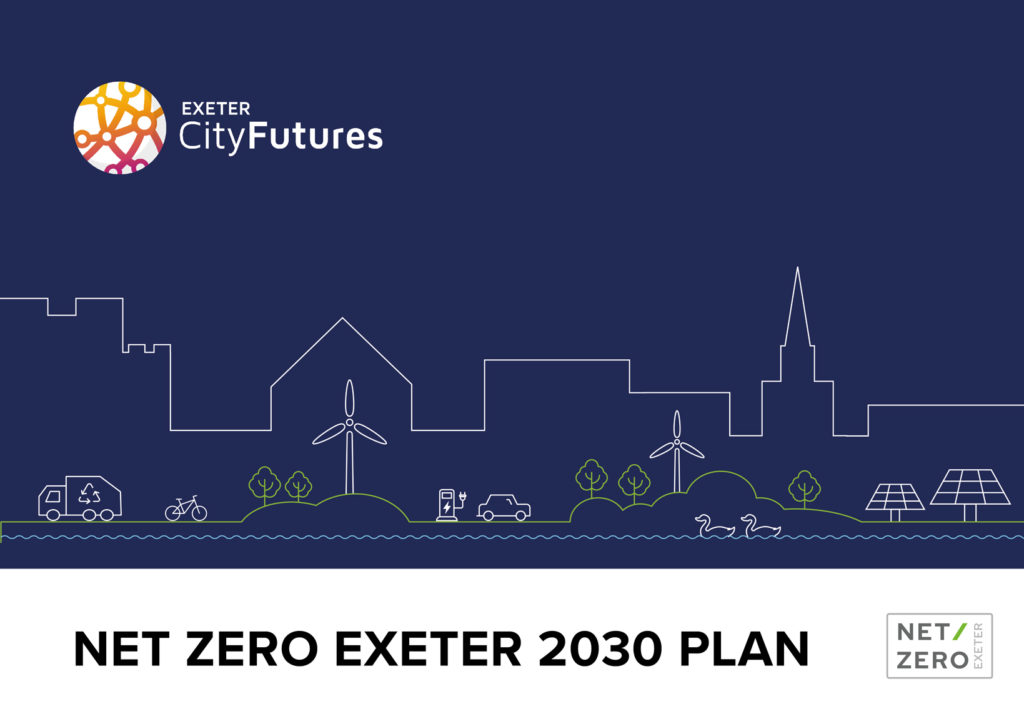Exeter City Futures has launched the ‘Plan for a Net Zero Exeter’, a strategy for how the city could become carbon neutral by 2030. People, businesses, and institutions from across the city have been included in the development of the strategy.
Unlike many other cities with similar goals, Exeter is the only city to create a collaborative governance structure that acts as a ‘City Office’ to help deliver its carbon-neutral ambitions as a coordinated city.
Exeter City Futures’ strategy to deliver a carbon neutral Exeter looks across the infrastructure of the city as a whole. This includes an in-depth look at how the city can create reliable journeys and resilient roads; renewable energy access for everyone; clean air for Exeter; collective action; affordable healthy homes for everyone; an analytical approach; how we can reduce the dominance of cars; reduce energy consumption; green spaces and local produce; locally controlled finance; efficient resource management and regenerative design.
Dr Liz O’Driscoll, Managing Director, Exeter City Futures said: “Despite the unprecedented coronavirus pandemic, I’m extremely pleased to present the Net Zero Exeter plan to Exeter City Council and the city on how Exeter can be carbon neutral by 2030.
“It has been four years in the making with collaboration with the many different communities, institutions, organisations and individuals who make up our city.
“This plan represents the contribution of hundreds of businesses and individuals across Exeter, who have engaged with us to set out the action plan to become a carbon-neutral city and ensure it remains one of the best places to live in the UK.
“Everyone across Exeter has a role to play, this isn’t something that can be delivered by any local authority alone.
“Many businesses and individuals are now struggling to deal with the impacts of COVID-19 and this is likely to change the way the city views and responds to the plan.
“More than ever the city needs to come together to think about the kind of future that we really want, and make it a reality.”
 This is the first iteration of the Net Zero Exeter Plan, curated through extensive engagement across the city, and is intended to be in constant review. It will be refreshed towards the end of 2020 to reflect on the position of the city as a result of the coronavirus, and then annually as the city begins to mobilise projects and action that feed into Exeter’s carbon ambitions.
This is the first iteration of the Net Zero Exeter Plan, curated through extensive engagement across the city, and is intended to be in constant review. It will be refreshed towards the end of 2020 to reflect on the position of the city as a result of the coronavirus, and then annually as the city begins to mobilise projects and action that feed into Exeter’s carbon ambitions.
Some of the key findings of the plan include that if businesses in Exeter were provided with carbon reduction resources, more than 34,000 tonnes of carbon a year would be saved; 53,000 tonnes of carbon would be saved if 100% of Exeter’s electricity was generated from clean sources; 140,000 tonnes of carbon would be saved if Exeter were to exploit the maximum potential for renewable generation (solar, wind, geothermal).
Exeter City Futures will continue to listen to people regarding the plan in light of the current climate. With the nation in lockdown, Exeter City Futures will be working over the next few months to develop ways in which people, whether as individuals, or as representatives of businesses, clubs, communities or institutions, can continue to play their part in the city’s ambition to become net zero.
Net Zero Exeter Open Conversations
Exeter City Futures team is launching the first of a series of conversations about Net Zero Exeter online, providing an introduction to the roadmap and allowing people to take part in discussions on how we can make Exeter carbon neutral by 2030.
While the launch of this document was due to take place at the Net Zero Exeter Mobilisation Summit, which had to be postponed as a result of COVID-19, Exeter City Futures has kept to its commitment to producing the plan and has now presented it to the City Council.







